by Professor Li Ping-Nan
Master Chin Kung’s Dharma Teacher
--------------------------------------------
Professor Li Ping-Nan was Master Chin Kung’s Dharma Teacher. Professor Lee’s Dharma teacher was Patriarch Yin Guang.
The following article was adapted from a small book by Professor Lee titled “A Buddhist Goal that Can Be Achieved in One’s Present Life”. In this book, Professor Lee describes some of the characteristics of the Pure Land and explains how Pure Land practitioners can use the technique of Buddha recitation to achieve rebirth there.
Two important sections of this article are titled “Morning and Evening Devotions” and “The Ten Recitation Method”. These two sections explain exactly how you can practice Buddha recitation every day, at home.
--------------------------------------------
Life is difficult most of the time.
Who can avoid sickness, aging and weakness, separation from loved ones, deaths of friends and family members, loss of wealth, and hate and mistreatment from others?
The poor seek wealth, the childless want to have children, the unemployed want to find work, and on and on.
How many of these wishes can come true? Is there any way to solve these unfortunate problems?
Life is full of calamities.
Many people die in hurricanes, earthquakes, floods, and fires. Many others starve due to drought or too much rain. Unexpected death is facing us every year. In a nuclear or biological war, the human race could be eliminated. Is there any way to avoid these disasters?
The revolving wheel of birth and death is painful.
And death is not the end. A living body can die, but its consciousness never dies. Upon the death of the body, consciousness leaves the body and goes to one of the six paths: heaven, the human world, the asura world, the animal world, the hungry ghost world, or hell. Heaven and the human world are the better places of these six, but the cycle of birth and death is unavoidable. Everybody has to go through the birth-and-death cycle on one of the six paths. Imagine how terrible it must be in the animal world, and how painful it must be in hell! The birth-and-death cycle through the six paths is known as the “six-path revolving wheel of Birth-and-Death”. Is there any way to escape this revolving wheel of Birth-and-Death and secure a peaceful, happy eternal life?
Overcoming Life’s Difficulties and Escaping From the Cycle of Birth and Death
Eliminate life’s difficulties and divert calamities.
Whether we have a fortunate life or an unfortunate life is determined by our own mind and our own behavior. It is a system of cause and effect.
Causes and effects involve three time periods: the past, the present, and the future. A difficult life and the occurrence of disasters are results of previous evil thoughts or bad behavior. But can divert and avoid unfortunate events by reciting Buddha’s name. The Sutras tell us that serious offenses and crimes committed aeons ago can be eliminated by sincerely reciting Buddha’s name.
The Sutras also say that there is a limitless number of Buddhas in the universe who protect those who recite, “Amitabha Buddha”. Buddha possesses infinite virtue, supreme wisdom, and boundless might. If you have Buddha’s blessing, no disaster can befall you.
Escape the revolving wheel of birth and death and attain enlightenment.
Is there any other place besides the six paths? The answer is yes. The six paths are worldly, common states. There are also holy places that are the states of Buddha.
There is a World of Ultimate Bliss that lies to the west, far away from our world: the realm of Amitabha Buddha – the Pure Land. Everything there is made of gold and seven kind of precious jewels. The environment is pure and magnificent. It is superior to any palace in any other heaven by a million-fold. (There are many layers of heaven). Life in the World of Ultimate Bliss is eternal, in contrast to that on the six paths, which are locked in a continuous cycle of birth and death.
According to the Sutras, if you are born in the World of Ultimate Bliss, your body is as radiant as gold. You are full of spiritual power. You manifest clothing and food by simply thinking about them. Your life is eternal, and you will become a Buddha after you complete your study under Amitabha Buddha.
How do you get to the World of Ultimate Bliss? According to the Sutras, Amitabha Buddha will lead you there at the end of your life, provided that you repeatedly and single-mindedly recite “Amitabha Buddha” until you have achieved perfect concentration.
All these benefits are described in the Sutras.
Benefits of Buddha Recitation
Here are ten benefits you can gain by reciting “Amitabha Buddha”:
• The protection of all heavenly gods, day and night.
• The protection of 25 great Bodhisattvas, including Guan Yin.
• The protection and blessings of all Buddhas. Particularly, Amitabha Buddha will shed light on you and protect you.
• No evil spirits or poisonous snakes can harm you.
• Flood, fire, and weapons will not harm you. Accidents will not happen to you.
• The karma of your past wrongdoings, mischievous deeds, and misbehaviors will all be
eliminated.
• You will have no nightmares – only peaceful dreams. In them you may see Amitabha
Buddha’s radiant golden image.
• You will be happy, good-looking, energetic, healthy, and successful.
• You will have the respect of other people.
• As the end of your life approaches, you will not be afraid and you will be of sound mind. The Three Sages of the World of Ultimate Bliss will present you with a golden platform and will lead you to their realm [the Pure Land]. There you will be born by transformation from a lotus flower, and will enjoy both happiness and eternal life.
Of these ten benefits, the first nine can change the difficult life you are now living to a smooth and peaceful one, while the tenth benefit frees you from the revolving wheel of birth and death.
Morning and Evening Devotions
To practice Buddha recitation, perform these simple morning and evening recitations.
1. Recite: “Homage to our teacher, Shakyamuni, Buddha of loving-kindness and compassion.” (During this recitation, bow or hold your palms together in front of your chest.)
2. Recite: “Homage to Amitabha, Buddha of great loving-kindness and compassion.” (Again, bow or hold your palms together in front of your chest.)
3. Recite “Namo Amitabha” or “Namo Amitabha Buddha” at least 100 times – the more
repetitions, the better. You can kneel, sit, or stand. There is no need to bow, but be respectful and sincere. You can increase the number of recitations you do each day, but you should not decrease them.
4. Recite: “Namo Guan Shi Yin Bodhisattva”. (Recite and bow once).
5. Recite “Namo Da Shi Zhi Bodhisattva” or “Homage to Great Strength Bodhisattva”.
(Recite and bow once.) (Guan Shi Yin [or Guan Yin] and Da Shi Zhi [or Great Strength
Bodhisattva] are Amitabha Buddha’s two great assistants in the Pure Land; together; the three are known as the The Sages of the World of Ultimate Bliss. They are our teachers and friends, and we bow to them to show our respect.
6. Recite: “Homage to the Great Pure Sea of Bodhisattvas.” (Recite and bow once) There are many Bodhisattvas in the World of Ultimate Bliss. They are all our future teachers and friends.
7. Recite the following Verse for the Transference of Merit: “I vow to adorn the Buddha’s pure land with this merit. Repay the four gracious kindnesses and aid those in the three paths of suffering below. May those who see and hear my vow all bring forth the Bodhi mind. And when this life is finished, may we be born together with other devotees in the World of Ultimate Bliss.” (This declaration is to direct the merits of reciting the Buddha’s name to glorify Buddha’s pure land, to help those named in this paragraph, and to affirm our determination to be born in the World of Ultimate Bliss. A different version of a recitation for the transfer of merit is presented on the page titled “Dedication of Merit”.)
8. Bow.
The preceding exercises should be performed twice every day: in the morning and in the evening. You should clean your hands and rinse your mouth before starting your recitation. You can omit the bowing if there is no portrait of Buddha to bow to. If possible, you can light some incense before you begin, but you can omit the burning of incense if it is inconvenient. You should face to the west if possible, and you should be sincere.
If time permits, between Steps 2 and 3 you should recite the “Amitabha Sutra” once, the “Vow to Achieve Birth in the Pure Land”:
“We wish to be born in the Western Pure Land
From nine levels of lotus blossoms.
When the lotus opens,
We shall see the Buddha and shall be enlightened to the eternal Truth,
With Bodhisattvas who never regress on the Path as our companions.”
three times, and the “Verse in Praise of Amitabha” once:
“Amitabha’s body is the color of gold;
The splendor of his hallmarks has no peer.
The light of his brow shines around a hundred worlds;
Wide as the seas are his eyes pure and clear.
Shining in his brilliance by transformation
Are countless Bodhisattvas and infinite Buddhas.
His forty-eight vows will be our liberation;
In nine lotus-stages we reach the farthest shore.
Homage to the Buddha of the Western Pure Land,
Kind and Compassionate Amitabha!
Homage to Amitabha Buddha!”
The Ten Recitation Method
The exercise presented in the previous section is designed for very busy people, and the following two-step exercise is designed for people who are even busier than that. It takes only five minutes to complete, and it is the simplest and the most practical method for assuring success in this lifetime:
1. Recite the words “Namo Amitabha” or “Namo Amitabha Buddha” three, five, or more
times as you take one breath. Repeat this exercise with each breath for ten breaths.
2. Finish this exercise by reciting the Verse for the Transference of Merit presented in Step 7 of the previous exercise or on the page titled “Dedication of Merit”.
The most important requirement for practicing this method is to do your recitations both in the morning and in the evening, every day. Face a portrait of Buddha if you have one, and try to face west as you recite.
Ingredients for Success in Buddha Recitation
Recitation and Good Behavior.
Reciting Buddha’s name is the main ingredient for success in Buddha recitation. Good behaviors are the supplemental ingredients. Both are necessary to assure full benefits and success in practicing Buddhism. They are like the two wings of a bird; both are required for a bird to fly.
Many people cannot distinguish good behaviors from evil ones. The following is a list of ten bad behaviors , as presented in the Sutra on the Ten Paths of Good Karma. If you do not practice any one of these ten bad behaviors, your behavior is good. Conversely, if you practice any one of them, your behavior is bad:
1. Killing.
2. Stealing.
3. Committing adultery. (The first three bad behaviors are known collectively as the three physical evils.)
4. Lying.
5. Erotic language.
6. Evil talk.
7. Two-tongued talk. (Bad behaviors 4 through 7 are known as the four oral evils.)
8. Greed.
9. Anger
10. Delusion. (Bad behaviors 8 through 10 are called the three mental evils.)
Points to remember about the ten bad behaviors:
• Injuring an animal, large or small, is considered killing.
• If one acquires property or fame through dishonest or illegal means such as stealing, robbery, cheating, or coercion, it is considered stealing.
• Any sexual activity between people who are not husband and wife is adultery.
• Any talk that is less than true is lying.
• Any oral or written language that advocates excessive or abnormal sexual behavior is considered erotic language.
• Impolite, scornful, or hostile language is evil talk.
• Using language to divide other people’s friendship and mutual trust is two-tongued talk.
• Excessive or ceaseless desire for property and wealth, with a failure to give to good causes, is greed.
• Flying into a rage whenever something desired is not acquired as desired is anger.
• Lack of wisdom, unreasonableness, being opinionated, and refusing to believe the Buddha’s teachings on causality are all forms of delusion.
Conditions for Being Born in the Pure Land
There are 84,000 ways of practicing Buddhism, but reciting Buddha’s name in order to be born in the World of Ultimate Bliss is a special method. It has been called “the greatest path of all paths”. Although the method is very simple, the principle is beyond our comprehension; only a Buddha can really understanding it. However, one does not need to understand the principle to practice it and to reap its full benefits. Remember that a Buddha has the highest moral standards, and that the words of a Buddha are always true. Consequently, whatever is said in the Sutras must be true.
There are three conditions for being born in the World of Ultimate Bliss: belief, determination, and practice. These three conditions can be summed up as follows:
• To succeed in Buddha recitation, we must believe that there is a World of Ultimate Bliss, and that we can be born there if we recite Buddha’s name.
• Second, we must realize that this is the evil world of the five turbidities, and that we must have a firm and sincere determination to go to the World of Ultimate Bliss in order to be reborn there.
• Third, we must practice reciting Buddha’s name every day.
Follow successful examples.
There are many examples we can follow to achieve success in Buddha recitation:
• Because of his great kindness and compassion, Shakyamuni Buddha taught us how to recite Buddha’s name in order to be born into the World of Ultimate Bliss. This is the simplest, surest way of escaping from the cycle of birth and death and attaining enlightenment. All other paths are much more difficult. Many great scholars have studied the path of Buddha recitation and discovered that the more they studied it, the more they appreciated it, and the more they became convinced that it is the most suitable path for everybody.
• In the Flower Adornment Assembly, both Wen Shu and Pu Xian – two sages who are
assistants to Shakyamuni Buddha – advised people to practice this path. The two great
Bodhisattvas of India, Ma Ming and Lung Shu, advocated Buddha recitation as the path
for everybody. In China, great Dharma masters from Hui Yuan to Yin Guang started
practicing other paths but later switched to this path.
• There are countless numbers of Great Masters and other persons who have practiced and embraced this path. We should follow their examples.
Study the Sutras.
The Pure Land path is mentioned in almost all Buddhist Sutras. However, three Sutras discuss it most specifically: The “Amitabha Sutra”, the “Infinite Life Sutra”, and the “Contemplation Sutra”. One should read the “Amitabha Sutra” many times. If time permits, one should read other Sutras, commentaries, and other materials about the Pure Land and Pure Land Study.
Common erroneous ideas
There are several erroneous ideas that can adversely affect your Pure Land Study:
• “Good thoughts and good behavior are as good as reciting Buddha’ s name”: Everyone has experienced the evil mind sets of greed, anger, and delusion. Furthermore, many people often commit the physical evils of killing, stealing and adultery. Consequently, you probably cannot say that you always have decent thoughts and exemplary behavior. Even if you did, these merits would only help you cultivate your future fortune and well-being – that is, they could help you attain rebirth in a heaven or as a human being after your present life, but they would not help you escape from the cycle of birth and death or to achieve rebirth in the World of Ultimate Bliss. If you want to be in the World of Ultimate Bliss, you must
cultivate wisdom. Wisdom can be cultivated through the recitation of Buddha’s name. It is important that you distinguish wisdom from good fortune. Do not confuse them and miss the chance of going to the World of Ultimate Bliss.
• The common excuse of “I’m too busy to recite Buddha’s name”: By reciting Buddha’s
name, you can ease your difficult life, avoid disasters, and be reborn in the World of Ultimate Bliss. So do not take it lightly. Do not allow the excuse of “having no time” to let this opportunity slip away. Being “too busy” is not a good excuse because you can recite Buddha’s name at any time: whether you are walking, sitting, or resting. No matter what your vocation is – education, farming, industry, or business – you can practice Buddha recitation without affecting your work. The following passage, called “Not Busy”, will show that you are not too busy to recite Buddha’s name.
Not Busy
You are really not busy, yet you insist that you are. There are 24 hours in a day: eight hours for sleep; three hours for meals; one hour for coffee, refreshments, and bathroom breaks; at least two hours to go out for a drink and to return home and chat; and two hours for a nap – making a total of 16 hours. You may have many things to do for the remaining eight hours. But you cannot say that it’s too time-consuming if you devote just half an hour to recite Buddha’s name.
If you want to put off reciting Buddha’s name until some future time, you should remember that life is as fleeting as a breath, and that death makes no distinction between the young and the old. Do not forget the pain we suffer on the revolving wheel of birth and death. Escaping this suffering and being born in the World of Ultimate Bliss is life’s most important business.
Guidelines to remember when reciting Buddha’s name
When reciting Buddha’s name, you must set everything else aside and concentrate. Recitation of Buddha’s name must be initiated by your mind, must be recited by your mouth, must enter your ears, and must register in your mind. You must think clearly, recite clearly, and hear clearly. Only in this way you can get a result.
Clearing up some misconceptions
Some people say: We live in a dormitory or other shared quarters. It is inconvenient to bow and pay homage to Buddha. We would disturb other people if we recite.
Answer: It is true there are some inconveniences involved in reciting in a public place. But if you realize how important Buddha recitation is, you can sincerely recite Buddha’s name in your mind, without making a sound – and you will attain all the benefits of Buddha recitation. It is not necessary to recite and bow in front of a portrait of Buddha if that is inconvenient; the most important thing is to be sincere.
Some say: I don’t have time to visit a monastery, temple, or learning center.
Answer: You do not have to go to those places to practice Buddha recitation. You can recite Buddha’s name at home.
Some say: Reciting Buddha’s name is for those who have money – I do not have money for this.
Answer: There is no need to spend any money. Paying homage to Buddha with three sticks of incense does not cost much. You even do not have to have incense. The only thing you need is to be respectful and sincere in your mind.
Some say: One must be a vegetarian to practice Buddhism. I cannot be a vegetarian.
Answer: You do not have to be a vegetarian for the time being. The important rule is not to kill. If you can avoid killing animals, you shall be credited with great virtues. You can eat “three-pure meat” for your meals.
“Three-pure meat” has the following characteristics: The animal was not specifically killed for you; you did not witness the killing; and you did not hear the killing. There is plenty of meat and fish (not live) in the markets that is “three-pure meat”.
-----------------------------------
Tuesday, August 12, 2008
Subscribe to:
Post Comments (Atom)











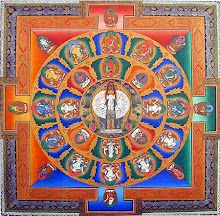




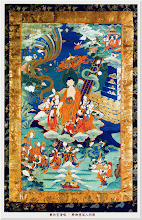

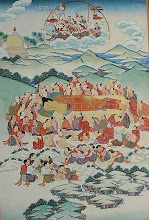


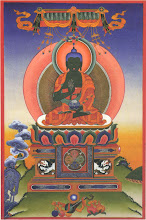




.jpg)

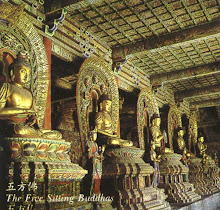













No comments:
Post a Comment